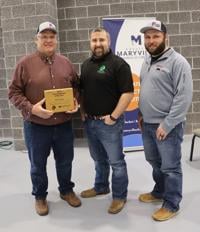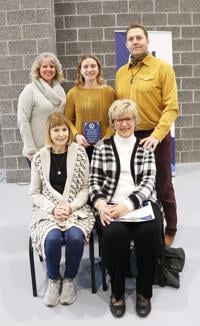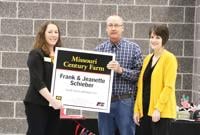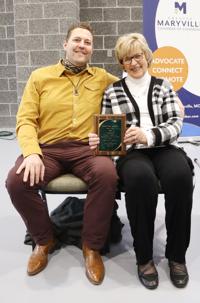MARYVILLE, Mo. — The Greater Maryville Chamber of Commerce 61st annual Farm-City Banquet breakfast held Friday morning at the Northwest Missouri State University Agricultural Learning Center recognized numerous people, families and groups within the Nodaway County agriculture community.
As emcee, Chad McCollough thanked students from the Northwest Technical School Culinary Arts class who helped serve at the event as well as event sponsors: Northwest Missouri State University, Ag Power, Nodaway Valley Bank, Farmers Mutual Insurance of Nodaway County, FCS Financial, the Nodaway County Soil and Water Conservation District and the Nodaway County Cattlemen’s Association.
Pastor Chad Mayne, with The Bridge, led the group of around 150 people in a brief invocation before tables made their way to the main hallway where students served a breakfast of steak and eggs. Steaks were provided and cooked by the NCCA.
During the meal, presenters spoke about their honorees presenting each with awards.
Outstanding Conservationist
Colton Coffelt, district manager of the Nodaway County Soil and Water Conservation District, introduced this year’s Outstanding Conservationist Bob Lager.
Lager has been a member of the Nodaway County Soil and Water Conservation District for 14 years and has led it as chairman for the past seven, Coffelt said.
During those years, the district spent just shy of $14 million in Nodaway County.
“That’s a lot of money and its coming into our county so he was a big part of that as a member on that board,” Coffelt said.
Lager has implemented and installed numerous conservation practices over the years such as no-till, cover crops, ponds, terraces, nutrient management, pest management and others.
“Bob actually was one of the landowners that participated in the pilot cover crop program with the state,” Coffelt said. “… Bob’s always one to be counted on and is open to new ideas and suggestions.”
Outstanding Farm Advocate

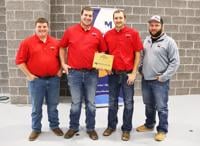
Joseph Frueh, Colton Holtman, Kyle Schieber and Shelby Lager with the Nodaway County Cattlemen’s Association received the Outstanding Farm Advocate award during Friday morning’s Farm-City Banquet held at the Northwest Agricultural Learning Center.
McCollough announced the Nodaway County Cattlemen’s Association as recipient of this year’s Outstanding Farm Advocate.
The Chamber Ag Committee selected the organization because it tirelessly fights to keep agriculture at the forefront of the community’s mind.
The organization not only donates beef to all school districts throughout the county, but also spend time talking with beef producers throughout the county about issues important to them, McCollugh said.
“They’ve done a fantastic job,” he said.
Maryville Rotary Club member Kelley Baldwin presented the Frank Felton Outstanding Farm Youth award and scholarship to Kayley Hauber, daughter of Brad and Kara Hauber and a student at Jefferson.
The scholarship began in 2005 and is a tribute to Felton, a long-time Rotarian, farmer and active member in the Maryville agriculture community.
Baldwin said the partnership between the Felton family and Northwest Missouri State University is a long one and this scholarship continues it by providing funds for a Nodaway County student to attend Northwest with an interest in agriculture.
Hauber is senior who is very active in FFA, 4-H, Fellowship of Christian Athletes and National Honor Society.
He has also competed on a state level in livestock and horse judging, track and field, softball and basketball.
“Growing up on a cattle farm, Hayley has always had a passion in agriculture,” Baldwin said. “She has used her participation in FFA to start her own production herd by keeping back heifers that she raised from bottle calves.”
She plans to attend Northwest to earn an undergraduate degree in pre-vet sciences and become a large animal veterinarian.
Outstanding Female in Agriculture

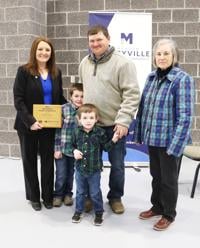
Jackie Lacy stands with family on Friday after receiving the Outstanding Female in Agriculture award. Shown from left are: Lacy, James, Jackson, James and Betty Campbell.
McCollough introduced Jackie Lacy, the recipient of the Maryville Host Lions Club Outstanding Female in Agriculture award.
“Jackie has an incredible resume, of her past impacts in Nodaway County being a former high school ag teacher,” he said.
Currently Lacy is a senior instructor at Northwest’s Department of Agriculture, “forming and inspiring students to become ag teachers themselves to fill essential teaching roles in rural America,” McCollough said. “(She is) impacting not only Nodaway County but a long reach across our state and our country.”

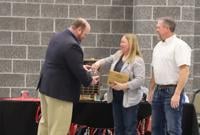
Teri and Michael Roberts select a winning name for a door prize at the 61st annual Farm-City Banquet held Friday at the Northwest Agricultural Learning Center. The Roberts were named the Nodaway County Outstanding Farm Family.
McCollough introduced Michael and Teri Roberts, selected as Outstanding Farm Family by the Chamber Ag Committee.
“The family farm as a lifestyle, is an idea worth preserving which I think this year’s family proudly displays,” he said.
Dr. Michael and Teri Roberts own and operate Town and Country Veterinary Clinic where they treat all classes of livestock and small animals.
The family started a goat herd five years ago, when their daughter Allison purchased two for a 4-H project. That herd has expanded to 30 head shown across the Midwest.
The Roberts are members of the Countryside Christian Church the NCCA and the Iowa Meat Goat Association.
They were recognized this summer at the Missouri State Fair, as the Nodaway County Farm Family “for their involvement in and support of local agricultural activities,” McCollough said.

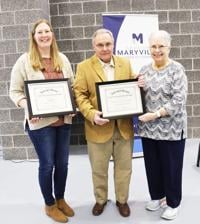
Inductees to the MU Extension Council Leadership Hall of Fame are Jackie Baker, Chris Wallace and Rosalie Wallace.
Dana Auffert, Youth Program Associate with the University of Missouri – Extension, presented Jackie Baker with a certificate recognizing her as one of the newest members of the MU Extension Council’s Leadership Honor Roll.
“This award recognizes individuals who have gone above and beyond their call of duty on behalf of Extension,” Auffert said. “This year we would like to honor Jackie Baker, Christopher Wallace and Rosalie Graves.”
Baker and her family have been serving Nodaway County Extension over the last nine years. For the past three years she has served on the Extension Council, and is currently the council secretary.
“Thank you Jackie for all your efforts and time that you’ve given to Nodaway County Extension and to 4-H,” Auffert said.
Randa Doty, County Engagement Specialist in Agriculture and Environment, recognized Chris Wallace and Rosalie Graves, who have been advocates for the University of Missouri – Extension and have served as officers on the executive committee.
“It’s people like Chris and Rosalie who truly believe in the land grant mission and how it can make a difference in people’s lives and move our communities forward,” Doty said. “We appreciate all your efforts to promote MU Extension and thank you for your support.”
Doty recognized two Nodaway County farms as Century Farms.
The Frank and Jeanette Schieber Family has owned their 231-acre farm near Stanberry since 1921.
The Kevin and Michelle Rosenbohm Family has owned a 338-acre farm near Graham since 1921. They were not on hand for the presentation.
Nodaway County Agriculture Hall of Fame
The people were placed into the Nodaway County Hall of Fame during Friday’s event: Frank Felton, Dr. David Frueh and Harold Wilmarth.
Bridget Kenny, with the MU Extension Council, read aloud the biographies of each recipient. Below are those words.
Frank A. Felton (1940-2003)
“A lifelong resident of Nodaway County, Frank Felton knew his career path from an early age. He grew up a fourth-generation farmer and farmed his entire life, but his primary focus was on livestock — specifically building his Hereford herd to produce genetics that could improve his herd and others.
Frank attended Maryville R-II High School and was active in the band, FFA and Boy Scouts (he was an Eagle Scout and attended the International Scout Jamboree in England where he played trombone). He then attended the University of Missouri where he was a proud member of Farmhouse. His time in Columbia changed his life in many ways, but two stood out. There he was introduced to the study of genetics in cattle – something he continued to study his career. But most importantly, he met the love of his life Lynn Denning, whom he convinced to marry him and move to Maryville upon graduation. Frank graduated with a double major, a BS in Animal Husbandry and Agricultural Economics.
Once back in Maryville, Frank and Lynn went to work building from scratch a Polled Hereford herd with the goal of producing superior bulls to sell to commercial cattle breeders in the area. All the while they were also farming with Frank’s father Austin Felton and raising a family of four in the home Frank grew-up in just east of town.
Frank continued to study and collaborate with other progressive cattlemen and extension office professionals as well as NWMSU and the University of Missouri with the goal of producing objective data to support their belief that cattle herds could be improved with the right genetics – acknowledging that each herd might need a different kind of bull to get its owners where they wanted it to be.
Over the next decades, Frank became a pioneer in performance testing and line-breeding and he became nationally and internationally acclaimed cattleman selling cattle across the United States and around the world – and bringing to the industry some of the most-storied (and used) bulls in the Hereford breed. Over his 40-year career, thousands of cattlemen and academics visited his operation in Maryville to see first-hand the Felton herd including hosting the World Hereford Conference in 1995 (he liked to chuckle and say ‘if you build it, they will come’), review his performance testing data, debate and discuss industry standards and trends, and get advice from Frank himself – regardless of the cattle breed. Everyone was welcome on the ranch – and many stayed for dinner. Over his career, he received many awards, including the ‘Beef Improvement Federation National Seedstock Producer of the Year,’ ‘Missouri Polled Hereford Breeder of the Year,’ ‘University of Missouri School of Agriculture Food and National Resources Citation of Merit,’ the ‘Outstanding Young Farmer in Missouri’ award and he was inducted into the American Hereford Association’s Hall of Fame. He also spoke at countless conferences around the region and across the country and internationally — traveling to speak in Canada, Australia (where a livestock facility was named for him because of his impact on cattle herds in the area), China and Argentina.
He was a loving husband, father and grandfather, who was always quick with a hug, smile and joke. He and Lynn devoted themselves to their family, especially their children. Their support and love were constant and unconditional. He relished and enjoyed their accomplishments more than his own. He was a great friend, confidant, and mentor to individuals in and outside of agriculture.”

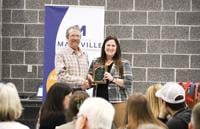
Dr. David Frueh receives a plaque from Bridget Kenny, with Nodaway County MU Extension. He was placed on the Nodaway County Agriculture Hall of Fame.
“Growing up on a wheat farm in Coffee Creek, Montana, Dr. David Frueh knew from a young age his love for agriculture and that he wanted to be a veterinarian. During Dave’s junior year of high school, his mom and dad decided it was time to move the family back to Nodaway County Missouri. Dave’s parents bought a cattle farm east of Hopkins, loaded up the station wagon, and moved the 9 children back to Missouri
Once they got settled into Missouri, Dave’s passion for cattle grew stronger. In the fall of 1973, Dave enrolled at Northwest Missouri State University to obtain his undergraduate degree. While attending Northwest, Dave worked for Dr. Joe Powell on the side. Dave created a strong relationship with Dr. Dennis Padgitt at Northwest that would be instrumental in his future of becoming a Doctor of Veterinary medicine. Through his undergraduate years, Dave worked countless hours custom baling hay with his dad’s tractor and helping with his family’s cow/calf operation anytime he could.
In 1973 Dave married Janelle Hagey. In the spring of 1978 Dave was accepted to the University of Missouri School of Veterinary Medicine. Though Dave did not have a 4.0 GPA he made an impression on numerous professors and professionals in the veterinary school which helped him secure his spot at Mizzou. With two young daughters, Dave worked for cattle farmers near Columbia to support his young family while still finding time to study and make his way through the intense schooling. Upon graduation, Dave returned to Maryville where he went into business with Dr. Danny Burns. Anyone who has ever helped Dave knows the stories of his early professional career are some of the best.
Through arduous work and perseverance Dave started Maryville Veterinary Clinic in 1994, which he still owns today. One thing that set Dave apart was his passion to stay on the forefront of veterinary medicine. With the help of his friend, Dr. Dennis Padgitt, he was one of the first vets to practice artificial insemination and embryo transfer in cattle. He built Maryville Veterinary Clinic into what it is today, with the help of Dr. Patrick O’Connell who partnered in the business in 2010. Dave has employed, mentored, and coached nearly one hundred college students throughout the years, and they all learned the definition of hard work, professionalism, and customer service in the time they spent with him. Employees that worked for Dave have gone on to become agriculture loan officers, grain traders, seed and chemical salesmen, and at least 8 have become veterinarians themselves, along with many returning to their family farms.
While Dave spent a considerable amount of his time tending to the clinic, he still found time to tend to his cattle. In 1986 Dave and his wife Janelle, bought an 80-acre farm just North of Maryville. Dave knew he wanted to raise purebred cattle and searched long and hard for what breed he thought was suited for Missouri. In 1985, Dave purchased four cow calf pairs of Salers from Iowa and brought them back to Missouri. With Janelle by his side, Dave was able to build his business into what it is today with a herd of over two hundred head mamma cows holding a bull/female production sale every March. In 2000, he partnered with his daughter Stacy Liebhart and her husband Scott as part owners, in which they still operate today known as Silver Spur Salers. Dave’s passion for helping young people get started in the cattle industry has never been more evident than watching his grandsons work alongside him developing their own passion for the cattle industry and Salers breed.
Dave and his wife Janelle have two daughters. Stephanie Othic and her husband Danny and their children, Carly, Rylie, Luke and Quade who live in Warrensburg, Missouri. Stacy Liebhart and her husband Scott have two boys, Landon and Easton and farm alongside Dave. Dave would be the first to say that he would not be where he is today without their love and support.”

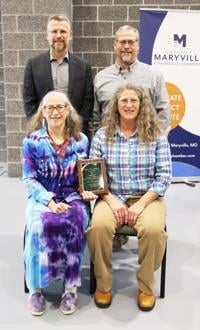
Harold Wilmarth’s children Scott and Todd Wilmarth, Shari Patterson and Tami Mundi were on hand for the presentation Friday at the 61st annual Farm-City Banquet held Northwest Agricultural Learning Center.
“Harold Wilmarth, known to many as Hal, grew up on a farm outside of Corning, IA with an older brother and two sisters. Hal excelled in football and wrestling and was involved in FFA at Corning High School. Hal continued his education at Northwest, graduating with a degree in Agriculture. Through the years, his love for the Bearcats never wavered. He was a devoted fan who traveled to Alabama and nationwide to pursue a Bearcat championship.
Hal worked throughout his college years in agriculture. Hal purchased a portable grinder and would mix the rations for farmers around Maryville. In 1963, Hal married Joy Couts and worked for the Espey family at Farmers Produce in Maryville and Hopkins, MO. Upon Hal and Joy graduating from Northwest, they, along with children Shari, Tami, and Todd, moved north to David City, NE, for a brief stint to manage the local Elevator in Ulysses. While in Nebraska, the opportunity arose to leave the Cornhusker state and return to Bearcat Green with one more son, Scott added for the return trip. In 1971 Hal and his older brother Neill bought the Espy Family business to become Farmers Elevator of Hopkins, MO co-owners.
The business began with the elevator buying and selling grain and a feed mill selling feed and seed in Northwest Missouri and Southwest Iowa. Throughout the years, the company expanded to include sales of dry and liquid fertilizers and chemicals and later added equipment to provide custom applications. Through the 40-plus years of managing the Elevator, hundreds of high school and college-aged people experienced agriculture for the first time or from a different perspective than their family farm. Hal was a teacher to many and definitely could chat with anyone. Hal marketed all the grain for the Elevator. He recorded the corn and soybean markets religiously by recording the daily basis prices from the early 1970s to enable the documentation of historical records when the use of computers became commonplace. The more he learned about marketing grain, the more important it became to share that knowledge with others.
The Elevator expanded to add two more fertilizer plant locations, Farmers Supply Company of Burlington Junction in 1986 and Mo Valley Ag in Rock Port in 1988. During the Farm Crisis in the 1980s, two expansive storage facilities were built to store corn for the government. One of the two was nicknamed “Cloud 9” due to the 12’ concrete walls and the billowing white inflatable roof. Upon completion, the two structures increased the business’s storage capacity to the point that Farmers Elevator had the largest storage capacity in Missouri for a privately owned company. The structures stored corn for the government’s storage program for a period of 10 years.
In 1989 Hal went to China as part of a U.S. Department of Agriculture delegation as the State of Missouri’s representative with his expertise in grain storage. Additionally, Hal served on many agriculture boards, including but not limited to United Ag Suppliers, Mo Ag Industries Council, and the Feed & Grain Association. He was also a member of Goodview, which invested in agriculture in Brazil. Hal traveled to the southern hemisphere to share advice and learn about their agricultural practices.
Hal owned several farms throughout the region that were custom farmed for soybeans and corn and operated a cow/calf herd of Registered Polled Herefords. Hal also would be known to have 50-plus bottle calves. He did have four kids who could raise them.
Agriculture was his passion. He was continuously learning and trying to find the best way to raise a crop, store it, and market it at the best price, all while conserving the land and resources. He never met a stranger and would always talk and listen to others to see and hear how they would do things and share his experiences and opinions.”

